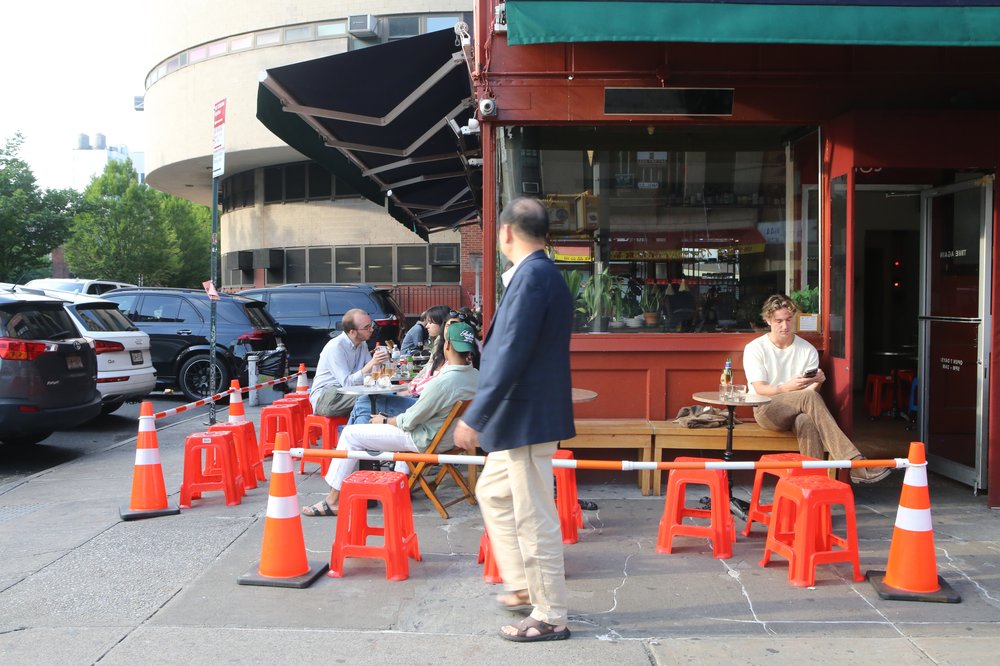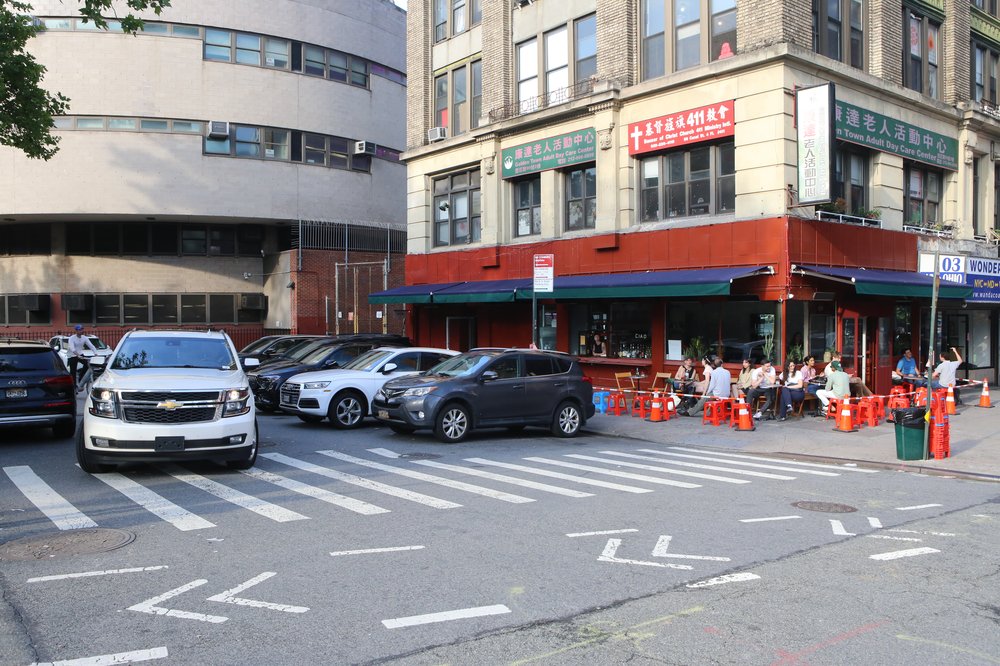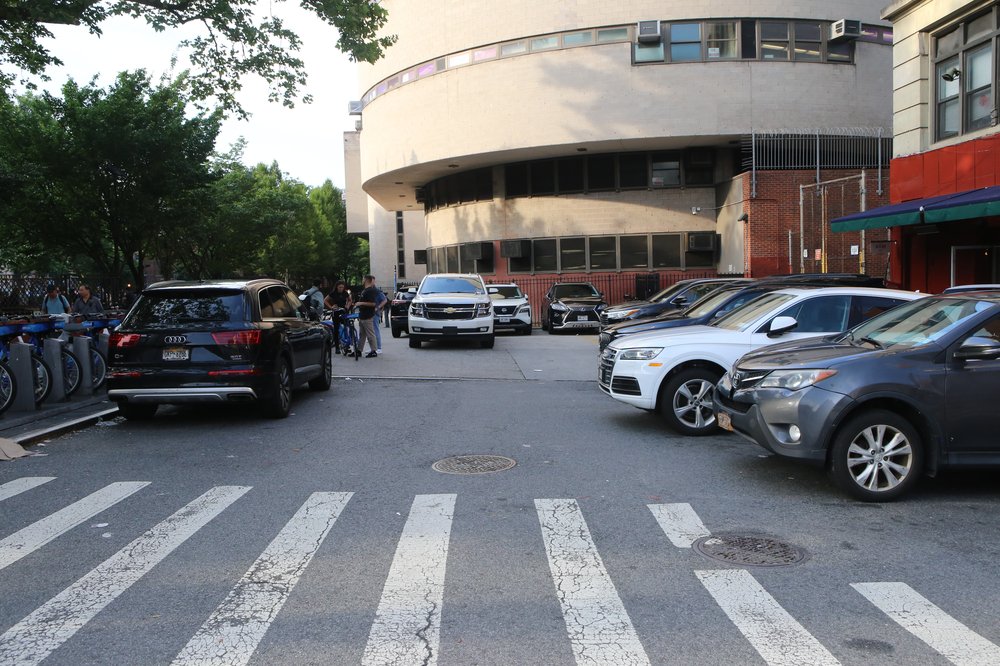A popular bar in Chinatown got an Open Streets permit. Then came the backlash.
June 11, 2025, 11:42 a.m.
“Every time I walk past that area, I have to navigate huge crowds of people who do not care for the community,” said Karen Liu, a longtime Chinatown resident and business owner.

Less than a year after GQ called it “the hottest club in NYC,” the parking lot outside the bar Time Again, in Chinatown, has become the flashpoint of a neighborhood debate.
The clash pits the owners and customers of a trendy bar against local residents and community groups, raising questions about who gets to use public space.
The issue took up the bulk of a Manhattan Community Board 3 meeting Tuesday night in the basement of a Mount Sinai Behavioral Health Center on Rivington Street.
Roughly 30 people spoke, nearly all of them opposed to Time Again’s newly approved Open Streets permit, which would let it close a dead-end stretch of Forsyth Street to cars every evening for the next six months and allow the bar to put out its plastic stools and tables.
The 30-foot-long cul-de-sac that separates the bar from Sara D. Roosevelt Park is technically not a parking lot, but is often used as one illegally.
Time Again became a destination last summer by offering something downright Brooklyn-ish: a laid-back block party atmosphere with open air, no rush and plenty of room to stretch out on the sidewalk and lot. Vampire Weekend and the Clipse played surprise outdoor sets that became the envy of the internet and brought the bar widespread attention.
Many locals were unimpressed.
“Who is this serving?” neighborhood resident Alice Liu said at the community board meeting. “It serves purely white people, celebrities and yuppies, none of which are people from this community.”
“Every time I walk past that area, I have to navigate huge crowds of people who do not care for the community,” said Karen Liu, a longtime Chinatown resident and business owner. “I also see a crowd that is not native to the community.”
The battle over the outdoor space is the latest high-profile conflict in the city’s evolving battle over outdoor dining — and its cousin, the Open Streets program — as new rules temper the pandemic-era program that gave bars and restaurants free rein.
“If we didn’t have outdoor dining, we’d be closed”
Time Again opened June 1, 2024, and immediately became a downtown hotspot.
Co-owners and NYC natives Alec Reinstein and Nick Poe rented 105 Canal St. in 2019 and cycled through a few concepts. Their sushi restaurant Time and coffee shop Time Café both failed in the small, roughly 40-seat space. The third Time was the charm, when the outdoor space unlocked its potential.
“If we didn’t have outdoor dining, we’d be closed,” Reinstein said in a phone interview. It was a lifeline that let the bar triple its seating in warmer months and bring in enough revenue to survive the leaner, indoor-only winter season.
Time Again was approved only for sidewalk seating in 2024, not roadway dining or Open Streets, but patrons spilled into the dead-end street anyway. In August, the bar received a summons from the city’s administrative court over the unauthorized roadway dining, but the summons was dismissed this May.
To Time Again's detractors, the crowds felt like an invasion. In a cul-de-sac ringed by public schools, an adult daycare center and Sara D. Roosevelt park, critics said the nighttime scene was noisy, its crowds blocked the sidewalk and fire hydrant, and that it prioritized outsiders over longtime residents. It wasn’t the community they knew, and to them, it looked like gentrification in real time.
“It’s not inviting to the community of Chinatown aunties and uncles,” said Yin Kong, director of the nonprofit Think!Chinatown, which has a mission of fostering community through neighborhood engagement, and organized the bulk of the protest against the Open Street. “There’s no community benefit.”
Kong said she’d once stopped some of the bar’s patrons from urinating on the wall of a neighboring building. She doesn’t see the need for the cul-de-sac to have an Open Street at all.

The noise from Time Again’s outdoor music events last year was the primary quality-of-life complaint raised by detractors at the community board meeting. The bar received 21 noise complaints last year, and five this year to date, according to 311 data.
“We could not sleep, we could not open our window,” said Justin Yu, a 50-year resident of Confucius Plaza, the 44-story apartment block that towers on the other side of the Manhattan Bridge. “Last summer was my worst time living in the building.”
Reinstein said the bar has curbed last summer’s excesses by hemming in the sidewalk seating with plastic barriers and closing it at 10 p.m. instead of 11 p.m., by ensuring hydrant access and by severely limiting amplified outdoor events.
He said that by the time the bar opens, schools are out and the adult daycare is closed, and that any unamplified noise impact is minimal because the whole block is commercial, though there are 32 residential units at the Canal Loft Hotel across the street.
“The thing that matters to me is: Did you talk to the neighborhood?” said Kathleen Webster, a Chinatown resident of 50 years who runs the Sara D. Roosevelt Park Coalition, a neighborhood improvement group. “You can’t just walk in here, decide this is going to be your party place, and expect the neighbors to go ‘Oh, great!’”
Reinstein said he reached out to the Chinatown Business Improvement District repeatedly when he first rented the space, leaving messages that got no response. The Chinatown BID did not respond to a request for comment in time for publication.
Reinstein said that while he obviously wants to put seating there, he’d like to share the lot with the community and work with neighbors to find a solution that makes it welcoming and accessible for everyone.
At the community board meeting, a half-dozen supporters of the Open Streets permit said the bar’s crowds and hired security made the notoriously sketchy area safer, and that closing the cul-de-sac to cars was a better use of space than allowing it to continue as an unregulated parking lot. On Tuesday evening, two of nine cars illegally parked there were blocking the fire hydrant.
They also said the bar has served as a valuable launchpad for early-career food entrepreneurs, by hosting frequent pop-ups from almost anyone who wants one. One example is Lizzy Koury, who runs Loser’s Eating House, a popular downtown bakery and catering business.
“I did my first-ever paid pop-up outside Time Again, and it’s evolved into private dinner parties, and a residency at [downtown venue] Jean’s, and so many custom cake orders that I now have my own commercial kitchen space,” Koury said. “It’s definitely changed my life.”

Another source of tension is that some people use the cul-de-sac to park.
Several community members said that teachers and staff at the public school building adjoining the stretch of Forsyth Street parked there, or used it to access a private gated lot.
“We need to get in and out,” said Tommy Chong, a building response team leader at Pace High School who said he was at the meeting representing the principals of all three schools that adjoin the lot.
After deliberating over precise language for half an hour, the community board — which can advise but not decide anything on Open Streets — voted not to support the permit for now, and to revisit the matter at their next committee meeting.
The Department of Transportation, which oversees the program, has already approved the Open Streets permit. Kate Scherer, a DOT representative who was at the meeting, said the agency would review community feedback before deciding whether to revise the terms.
Reinstein said he’s open to changes but hoping for some consistency. As a small business owner who failed repeatedly at the location, he said it was encouraging to finally turn a corner with the help of the outdoor seating.
“It’s disappointing to hear that so many people are upset with how we’re operating when the truth is we’ve listened to everything we’ve been told by city agencies and neighborhood people,” he said.
The Brooklyn Mirage was supposed to open over a month ago. Fans are frustrated. Where to eat in Times Square — and why you’d want to